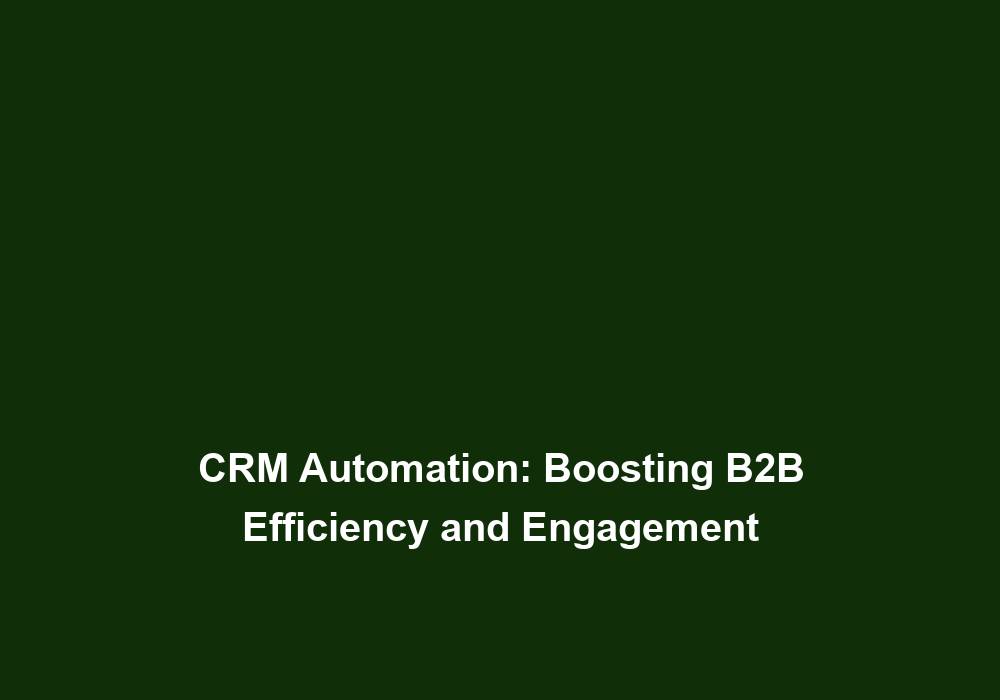Customer Relationship Management (CRM) automation has become an essential tool for businesses looking to enhance their B2B efficiency and engagement. In today’s competitive market, it is crucial for companies to effectively manage their customer relationships and streamline their processes. CRM automation provides a comprehensive solution that enables businesses to drive growth, improve customer satisfaction, and increase overall productivity. In this article, we will explore the benefits and strategies of implementing CRM automation for B2B businesses.
Understanding CRM Automation
CRM automation refers to the use of technology and software to automate various aspects of customer relationship management. It streamlines and centralizes important customer data, interactions, and tasks, making it easier for businesses to manage and nurture their relationships with clients. By automating repetitive and time-consuming tasks, businesses can focus more on building meaningful connections with their customers and prospects.
Increased Efficiency through Automation
CRM automation offers several benefits that boost efficiency in B2B businesses. By eliminating manual data entry, sales teams can dedicate more time to engaging with customers. This increased focus on customer interactions can lead to better relationships and higher conversion rates. Additionally, automating tasks such as lead generation, data organization, and follow-ups streamlines the workflow, resulting in improved operational efficiency and productivity.
Enhanced Customer Engagement and Personalization
A key advantage of CRM automation is the ability to gain valuable insights into customer behavior and preferences. By leveraging this information, businesses can deliver personalized and targeted communication, ultimately improving customer engagement. Automated follow-ups, reminders, and notifications ensure timely interactions, allowing businesses to develop stronger relationships with clients. With CRM automation, companies can tailor their messaging and offerings to individual customers, increasing the chances of conversion and loyalty.
Streamlined Sales Process and Improved Conversion Rates
CRM automation provides a systematic approach to managing the sales pipeline. By tracking leads, monitoring sales activities, and analyzing conversion rates, businesses can identify bottlenecks in the process. This visibility enables them to optimize their sales strategies, shorten sales cycles, and drive revenue growth. With the help of automation, sales teams can prioritize leads, focus their efforts on high-potential prospects, and increase their overall efficiency.
Optimized Marketing Campaigns for Higher Conversion Rates
CRM automation allows businesses to create and execute highly targeted marketing campaigns. By leveraging customer data, companies can segment their audience and deliver personalized content that resonates with their prospects. This personalized approach leads to higher conversion rates and a more effective use of marketing resources. Additionally, automated analytics and reporting provide valuable insights into campaign performance, enabling businesses to optimize their marketing efforts and achieve better results.
Improved Customer Service and Satisfaction
CRM automation plays a crucial role in enhancing customer service. It enables businesses to provide prompt and efficient responses to customer queries and issues, resulting in higher customer satisfaction and loyalty. Access to comprehensive customer data allows service representatives to understand customer needs more effectively, leading to faster and more accurate resolutions. By delivering exceptional customer service, businesses can differentiate themselves from competitors and build long-lasting relationships with their clients.
Strategies for Implementing CRM Automation
To successfully implement CRM automation, businesses should follow these strategies:
Define Your Objectives and Pain Points
Before implementing CRM automation, clearly define your objectives and goals. Identify the specific pain points you want to address and determine how automation can help overcome them. This clarity will guide you in choosing the right CRM software and configuring it to meet your business requirements.
Choose the Right CRM Platform
Selecting the right CRM platform is vital for successful automation. Consider factors such as scalability, integration capabilities, user-friendliness, and customization options. A robust CRM system should support your business goals and provide the necessary tools for automation.
Integrate Data Sources for Holistic Insights
To fully leverage the benefits of CRM automation, integrate data from various sources such as website analytics, social media platforms, and customer support channels. This integration provides a holistic view of customer interactions, enabling personalized and targeted engagement. By gathering data from multiple touchpoints, businesses can gain a comprehensive understanding of their customers’ preferences and behaviors.
Implement Lead Scoring for Prioritization
Lead scoring is an effective strategy for prioritizing leads based on their readiness to purchase. By assigning scores to leads based on predefined criteria, businesses can focus their efforts on high-potential prospects, increasing conversion rates and sales efficiency. This approach ensures that sales teams invest their time and resources in leads with the highest likelihood of conversion.
Automate Sales and Marketing Processes
Automate repetitive sales and marketing tasks such as lead nurturing, email campaigns, and follow-ups. This ensures consistent and timely communication with prospects and customers, enhancing engagement and driving conversions. Automation also allows businesses to maintain a personalized approach at scale, delivering the right message to the right audience at the right time.
Train and Support Your Team
Provide comprehensive training and ongoing support to your team to ensure they understand and adopt CRM automation effectively. Encourage collaboration and regularly review and optimize processes to maximize the benefits of automation. By empowering your team with the necessary skills and knowledge, you can ensure a smooth transition to CRM automation and maximize its impact on your business.
In conclusion, CRM automation offers numerous benefits for B2B businesses seeking to enhance their efficiency and engagement. By streamlining processes, optimizing marketing efforts, and nurturing customer relationships, businesses can drive growth, boost customer satisfaction, and gain a competitive edge. Implementing CRM automation requires careful planning, choosing the right platform, and aligning it with your business objectives. With the right strategies in place, businesses can unlock the full potential of CRM automation and thrive in today’s dynamic business landscape.
Note: This article is written in markdown format.
Sources:
- Source 1: Salesforce: What is CRM?
- Source 2: HubSpot: Benefits of CRM Automation
- Source 3: Zendesk: What is CRM Automation?
- Source 4: CoreDNA: How to Implement CRM Automation
